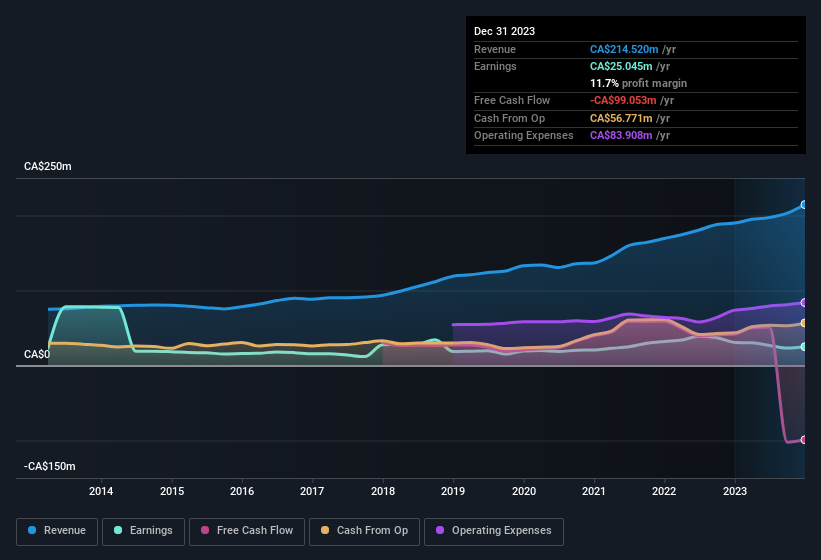- Canada
- /
- Real Estate
- /
- TSX:ISC
Weak Statutory Earnings May Not Tell The Whole Story For Information Services (TSE:ISV)
The market rallied behind Information Services Corporation's ( TSE:ISV ) stock, leading do a rise in the share price after its recent weak earnings report. Sometimes, shareholders are willing to ignore soft numbers with the hope that they will improve, but our analysis suggests this is unlikely for Information Services.
See our latest analysis for Information Services

Zooming In On Information Services' Earnings
One key financial ratio used to measure how well a company converts its profit to free cash flow (FCF) is the accrual ratio . In plain english, this ratio subtracts FCF from net profit, and divides that number by the company's average operating assets over that period. You could think of the accrual ratio from cashflow as the 'non-FCF profit ratio'.
Therefore, it's actually considered a good thing when a company has a negative accrual ratio, but a bad thing if its accrual ratio is positive. While it's not a problem to have a positive accrual ratio, indicating a certain level of non-cash profits, a high accrual ratio is arguably a bad thing, because it indicates paper profits are not matched by cash flow. Notably, there is some academic evidence that suggests that a high accrual ratio is a bad sign for near-term profits, generally speaking.
Over the twelve months to December 2023, Information Services recorded an accrual ratio of 0.49. Statistically speaking, that's a real negative for future earnings. To wit, the company did not generate one whit of free cashflow in that time. In the last twelve months it actually had negative free cash flow, with an outflow of CA$99m despite its profit of CA$25.0m, mentioned above. We saw that FCF was CA$42m a year ago though, so Information Services has at least been able to generate positive FCF in the past.
Despite the negative free cash flow, it's important to highlight that the company recently signed a 20-year contract with a major customer, securing a revenue-stream for the next 20 years. This indicates that the situation may not be as dire as it appears at first glance, with the long-term prospects bolstered by this agreement.
The good news for shareholders is that Information Services' accrual ratio was much better last year, so this year's poor reading might simply be a case of a short term mismatch between profit and FCF. Shareholders should look for improved cashflow relative to profit in the current year, if that is indeed the case.
That might leave you wondering what analysts are forecasting in terms of future profitability. Luckily, you can click here to see an interactive graph depicting future profitability, based on their estimates.
Our Take On Information Services' Profit Performance
As we discussed above, we think Information Services' earnings were not supported by free cash flow, which might concern some investors. As a result, we think it may well be the case that Information Services' underlying earnings power is lower than its statutory profit. Nonetheless, it's still worth noting that its earnings per share have grown at 18% over the last three years as well as the 20-year agreement which provides a predictable stream of cash flow for the next two decades, mitigating concerns about short-term negative free cash flow. The goal of this article has been to assess how well we can rely on the statutory earnings to reflect the company's potential, but there is plenty more to consider. Keep in mind, when it comes to analysing a stock it's worth noting the risks involved. For example, we've found that Information Services has 3 warning signs (1 can't be ignored!) that deserve your attention before going any further with your analysis.
Today we've zoomed in on a single data point to better understand the nature of Information Services' profit. But there is always more to discover if you are capable of focussing your mind on minutiae. For example, many people consider a high return on equity as an indication of favorable business economics, while others like to 'follow the money' and search out stocks that insiders are buying. So you may wish to see this free collection of companies boasting high return on equity , or this list of stocks that insiders are buying .
New: AI Stock Screener & Alerts
Our new AI Stock Screener scans the market every day to uncover opportunities.
• Dividend Powerhouses (3%+ Yield)
• Undervalued Small Caps with Insider Buying
• High growth Tech and AI Companies
Or build your own from over 50 metrics.
Have feedback on this article? Concerned about the content? Get in touch with us directly. Alternatively, email editorial-team (at) simplywallst.com.
This article by Simply Wall St is general in nature. We provide commentary based on historical data and analyst forecasts only using an unbiased methodology and our articles are not intended to be financial advice. It does not constitute a recommendation to buy or sell any stock, and does not take account of your objectives, or your financial situation. We aim to bring you long-term focused analysis driven by fundamental data. Note that our analysis may not factor in the latest price-sensitive company announcements or qualitative material. Simply Wall St has no position in any stocks mentioned.
About TSX:ISC
Information Services
Provides registry and information management services for public data and records in Canada.
Established dividend payer with proven track record.
Market Insights
Community Narratives



